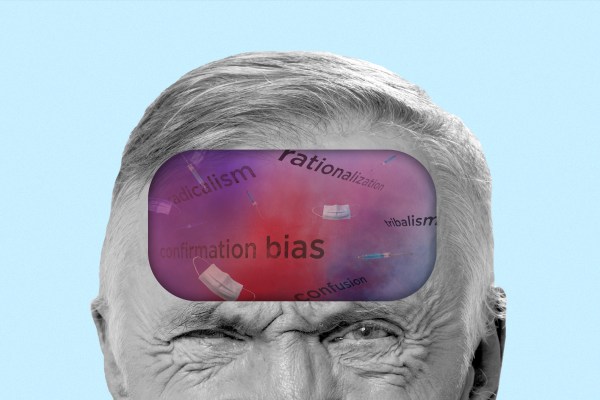All right, you maniacs, welcome to the 2024 presidential debates moderated by me, your favorite correspondent, Kevin D. Williamson of The Dispatch. You know the drill: The candidates have electrodes attached to their sensitive bits—thanks to Stormy Daniels for hooking those up—and every time one of them tries to pawn off the usual dishonest, stupid, cowardly bulls--t non-positions they retail to their low-rent, cheap-date partisans in our audience tonight, my wingman, Mitch Daniels is going to switch on the juice and those electrodes are going to light them up like Clark Griswold’s house at Christmas. Thanks to our sponsor, AmeriLectric Energy, for supplying 1,200 megawatts of clean, climate-friendly electricity from their just-opened nuclear facility here in Muleshoe, Texas.
For some reason, the Democrats wanted President Joe Biden to do this before the Democratic convention in Chicago. I can’t imagine why. But paramedics are standing by. Yes, they’re drunk. No, they aren’t really paramedics. And I’m not Jake Tapper.
No quarter, no mercy.
Are we clear?
All right, then.
The first question is always the same. Let’s see if one of you idiots has figured out an answer yet:
The vast majority of federal spending consists of popular entitlements such as Social Security and Medicare, national defense, and interest on the debt. We could cut SNAP, means-tested welfare payments, and foreign aid to $0 and not even eliminate the annual deficit. So, a multiple-choice question. Should we:
- Cut spending on national security and popular entitlement programs?
- Raise taxes?
- 1 and 2?
- Run deficits pretty much forever until there’s a fiscal crisis precipitating national, and, in all likelihood, worldwide economic collapse, because you are too cowardly to do anything hard?
… I’m sorry, Mr. Trump, “Make Mexico pay for it!” was a bulls--t answer the last time around. If you’ll recall, Mexico didn’t cough up a peso. And cutting Ukraine aid to $0 would cover only 16 days’ worth of Social Security expenses.
Hit him, Mitch.
Hey, Stormy. Quick question: He’s not, like, into that, is he? Just checking. No? And why would I ask Melania?
And your answer, Mr. President? Mr. President? I have to warn you, if your answer contains the words “fair share,” you’re going to get the zap.
… All righty, then. Get them both up. Does anybody else smell something like ozone and ketchup? No? Am I having a stroke?
Whatever. Next question.
Campus intifada: What to do?
Is the answer:
- Nothing, these mostly literally sophomoric idiots generally present a local police question, at most.
- Engage in intense moral grandstanding?
- Triangulate so as not to offend the … Hamas vote, I guess?
- Some weaselly combination of 2 and 3?
… Is the president okay? He’s just been staring into the camera for three minutes. Give him a little touch of the juice, Mitch. See if we can bring him out of it. Mr. President? Just nod if you can hear me. Is there anyone at home?
All right, moving on.
Ukraine: What are the U.S. interests? What are the Ukrainian interests? How are these aligned? How are they not aligned? Now, repeat with Israel.
Seriously? That’s the question we’re asking? Why wait as though we’re going to get an answer?
Do your worst, Mitch.
All right. The great thing about nuclear power is that you don’t really have to ramp it up when demand goes up. It’s just there. Like, a really high baseline of power. That’s a comforting thought, right?
Now, here’s a surprise: We’ve got Robert F. Kennedy Jr. here. Who wants to hear him talk about the vaccines with Trump?
“Greedflation.” Really? That’s your answer? It’s all a conspiracy on the part of Big Snack Food to put more air and fewer calories in a bag of Doritos? Let me ask this as unselfconsciously as possible: Does it seem to you that Americans are getting shortchanged in the Dorito department?
All right, then. Usually, we call this last bit “mopping up.” But since we are now literally mopping up …
Laugh, don’t laugh, whatever. Satire is hard these days. But the actual debate on June 27 is going to be less funny and more surreal than this.
Words About Words
Consider the mystery of tot. We use tot all over the place, in both American and British English: Little kids are tots who totter around and play on teeter-totters on the tot-lot, sometimes while eating tater-tots. English sailors in the 17th century enjoyed a “tot” of a half pint of rum a day—until “Black Tot Day,” July 31, 1970, the last day the Royal Navy issued its standard rum ration. In some parts of the world, a small stiff drink is still a tot. (Drinks often have protest-too-much names denoting something small, as in peg, or, as my Indian Express colleagues used to call it, chota peg, or “little peg.” I read this is technically supposed to be 30 milliliters of alcoholic spirits, which does not at all comport with my admittedly somewhat fuzzy memory of actual practice at the time.) A tot is a little bit of something, whether person or potato.
(Writing “July 31, 1970” above reminds me: In some other parts of the world, dates are more commonly written in the form “31 July 1970.” This seems to me greatly preferable and more easily legible, with the letters of the month’s name separating the numerals of the day and the year. If I were Dispatch editorial-style dictator, that’s how we’d do it.)
Older uses of tot include other terms generally oriented toward the small or the childlike, as in the Old Norse tottr, slang for a dwarf. Tot in the sense of “small child” is first attested in English in Scottish usage in the 18th century, though words related to totter—to walk unstably—go back centuries in Scandinavian languages. Toddle, which also first turns up in Scotland and the north of England, may be a conflation of totter and waddle. We still call children toddlers even if they are past toddling, and the childish sense of toddle was even more pronounced in earlier English, when it meant to play, as with a toy. Dodder may be another variant of totter, though one we associate with the end of the lifespan opposite toddling. Toddlers and doddlers: Make your own political joke.
But, as noted, the origin of tot remains unknown. Lots of little mysteries in English.
More Wordiness …
Half of the time, I love John McWhorter. The other half of the time, he is an Enemy of the People. Or, at least, an Irritant to This Person. This is an enemy week: “Lets [sic] Chill Out About Apostrophes.”
Surely if we can deal with rabbits running fast and chairs stuck fast to the floor, or to seeding a watermelon and seeding a field, we could deal with its and your having two meanings.
As Amy Winehouse says: “No, no, no.”
There’s nothing wrong with McWhorter’s argument or the history and facts he rallies to his cause. As usual, he’s impeccable as far as all that goes.
I just hate it.
Economics for English Majors
In the long run, markets run on supply and demand and on real-world economics. But in the short run, at least in the telling of John Maynard Keynes, they run on “animal spirits.” As one Wall Street guy put it, “In the long run, markets run on math. In the short run, they run on greed and terror.”
There are human emotions other than greed and terror. There is, of course, that quintessential human delusion that is so destructive in the economic context: hope. Wishful thinking. Optimism based on approximately squat, etc. Why are housing prices going to keep going up? Because they always go up—that’s how we like it! How is Social Security going to survive? Somehow, magically, because … we want it to! The Dow Jones Industrial Average (DJIA) has reached a record high, clearing 40,000 for the first time ever. There isn’t anything magical about 40,000, but it is a big, round number, and we think of big, round numbers as being significant, whether it’s birthdays or anniversaries or stock-market levels.
(Some people expected the Dow to reach 40,000 ... rather sooner.)
What does it mean for you? For the economy? For the Biden campaign? Does crossing the “psychological barrier” of 40,000 mean that it’s going to go even higher? None of that has anything to do with reality—not with reality-reality, anyway.
But the animal spirits don’t care about math. They like storytelling.
Storytelling is a funny business. How many times have you heard a smug progressive tell you, “The stock market does better under Democratic presidents”? That’s true, as a statistical matter—and it is the definition of a spurious correlation. The stock market also consistently performs better in years when an NFC team wins the Super Bowl. For years, the S&P outperformed historical returns in years when the model on the cover of the Sports Illustrated swimsuit issue was an American and underperformed when the model was of a different nationality.
Animal spirits are sometimes partisan spirits. But don’t let anybody fool you into thinking that having the DJIA at 40,000 means that Biden is good on the economy or that Biden is bad on the economy.
It doesn’t mean anything at all.
Another Economic Mystery …
I was discussing this with a friend late last week: Why do super high-end brands in some industries—but not in others—advertise on billboards? Billboards have always seemed to me kind of low-rent in general.
Driving around the freeways in, say, Dallas, you can see a lot of billboards for strip clubs and porn shops, but also for high-end timepieces: Rolex, Patek, Vacheron Constantin, etc. But you don’t see them for similarly placed brands in, say, the automotive market. I’ve never seen a Rolls Royce billboard. I find it hard to believe that there are a lot of people who are in the market for a $60,000 wristwatch who are going to be very much influenced by a billboard, or that somebody is going to suddenly pull off the Dallas North Tollway and head straight for the local Patek dealer because he saw a sign on the roadside.
(Set aside, for the moment, the other weirdness of the luxury-timepiece market, e.g., fully staffed boutiques with essentially zero inventory occupying expensive retail real estate. I get that Rolex has only one shareholder and that it is a charity, but, surely, the other big names have shareholders who would like a dividend every now and then.)
I can see maybe an ad in Monocle or The Economist (or, you know, The Dispatch, if we sold advertising) or some discreet but visible signage for your Beverly Hills boutique or whatever. But, billboards?
Somebody explain that one to me.
Elsewhere …
The usual story that inflation-wary politicians tell to voters is that things are better than they seem because “core” inflation is lower than overall inflation — “You’re in great shape, as long as you don’t have to drive or eat or consume anything that moves on a truck!” — but for Biden the story is reversed: Overall inflation has been partly eased by relatively large declines in food and fuel prices, but inflation for most things people buy is worse than it is at the grocery store or gas station.
… According to the Bureau of Labor Statistics, prices today are about 20% higher than they were when Biden was inaugurated in January of 2021.
A basket of goods that cost you $1,000 in January 2021 would cost you about $1,200 today.
An inflation rate of 3.6% is not great at any time, but an inflation rate of 3.6% on a consumer-price baseline that is 20% higher after years of persistently high inflation is even worse.
Think of it this way: An extra 3.6% on a $1,000 purchase in 2021 would have cost you $36; the same 3.6 percent extra for the same goods at today’s more expensive prices adds $43.
Which is to say, the problem for US consumers — and for Joe Biden — isn’t the inflation-rate snapshot for April.
The problem is the years of persistently high inflation that preceded it.
More in the New York Post, America’s newspaper.
You can buy my most recent book, Big White Ghetto, here.
You can buy my other books here.
You can see my New York Post columns here.
Please subscribe to The Dispatch if you haven’t.
You can check out “How the World Works,” a series of interviews on work I’m doing for the Competitive Enterprise Institute, here.
In Conclusion
I wonder if this even needs to be said in Anno Domino 2024: People married to Supreme Court justices, and to other famous and powerful people, are allowed to have political opinions. They are allowed to have dopey political opinions. They are allowed to publicly express those dopey opinions in a dopey fashion. That’s not to say that giving voice to said dopey views is prudent, but you don’t meet a lot of prudent dopes. Those things just don’t occur together very often in nature. Discretion isn’t just the better part of valor—it’s the better part of a lot of things.







Please note that we at The Dispatch hold ourselves, our work, and our commenters to a higher standard than other places on the internet. We welcome comments that foster genuine debate or discussion—including comments critical of us or our work—but responses that include ad hominem attacks on fellow Dispatch members or are intended to stoke fear and anger may be moderated.
With your membership, you only have the ability to comment on The Morning Dispatch articles. Consider upgrading to join the conversation everywhere.